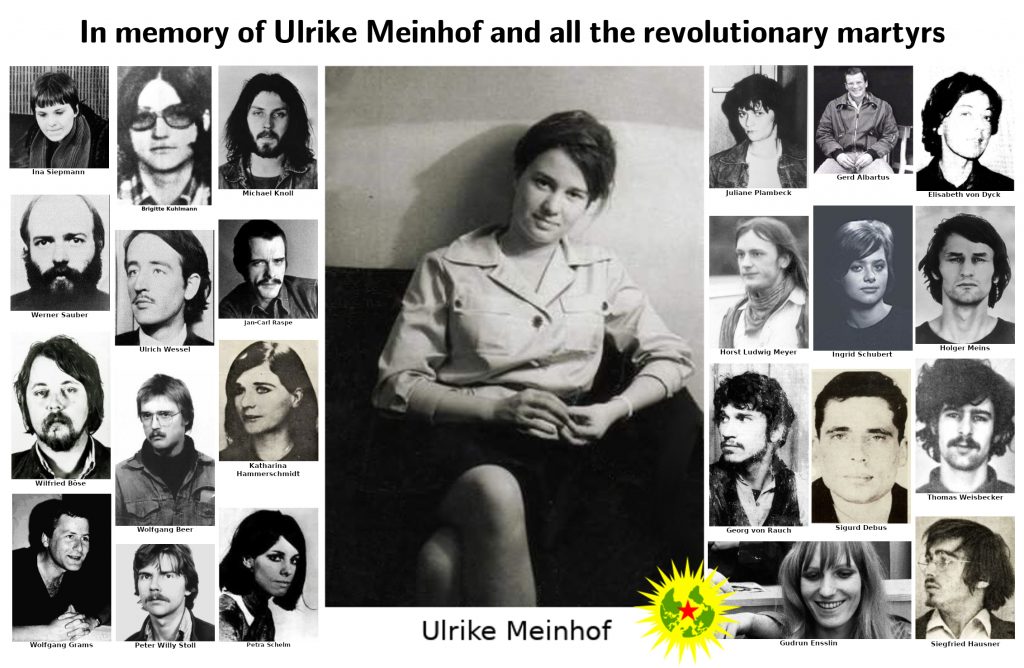In May, we will be releasing a series of articles related to the history of revolutionaries and their struggles. The stories and fights of Bobby Sands and Ulrike Meinhof, Hakî Karer and Deniz Gezmis still have a special meaning for us today and give us revolutionary perspectives for the future. As internationalists, we continue their heritage and struggle, until the success will be ours.
 I. “Remembering means fighting” – the day of Ulrike Meinhof’s death
I. “Remembering means fighting” – the day of Ulrike Meinhof’s death
“The feeling, one’s head explodes (the feeling, the top of the skull will simply split, burst open)
the feeling that the cell is moving. You wake up, open your eyes: the cell drives; In the afternoon, when the sun comes in, it suddenly stops.
One cannot get rid of this feeling of motion
Frenzied aggressiveness, for which there is no valve. That’s the worst. Clear awareness that one has no chance of survival; complete failure to convey that.
One expects the prisoner to lose self-control. Babbles”
These were words that Ulrike Meinhof wrote. It was the words with which she tried to describe what she felt in the total isolation of the psychiatric women’s section of the prison in Cologne, Ossendorf. From the words of Ulrike, the brutality of the system against the political prisoners speaks volumes and at the same time expresses the will to live and to resist the attempts at their psychic annihilation. In captivity, isolated and disarmed, they led this resistance with everything they had – their identity and their lives. “In isolation,” the RAF declared for the third of eleven hunger strikes, “this is our only means of collective opposition to the counter-strategy of imperialism … it is our only means, our physical and mental powers, our identity as human beings to drop the stone which the state of the ruling class has set against us, on his own feet.”
And the stone fell on the feet of the ruling class, because the resistance could not be broken despite torture, violence, betrayal and corruption. Only the physical annihilation of the RAF prisoners and leading militants was left to the state as a means to break this resistance. Ulrike wrote,
“If our identity is our political consciousness, whose content is collectivity (guerrilla, armed struggle), then they cannot tear it out by isolation without killing.”
During the night of May 9, 1976, Ulrike Meinhof was murdered in the high-security wing of Stammheim-Stuttgart Prison.
Ulrike, like the murdered revolutionaries of the first generation of the Red Army Faction, stood and fought for a project of liberation which, in times of imperialist wars against anti-colonial liberation movements and internal German continuation of fascism, broke with the system. This struggle knew only one way: the way towards social revolution. Only annihilation could break that resistance.
“We can only be suppressed if we stop thinking and stop fighting. People who refuse to quit the fight can not be oppressed – they either win or they die instead of losing and dying.”
And even if so many were physically destroyed, murdered in jail, shot from behind in the streets, and killed in battle, they did not lose because their struggle lives on in our memories. The RAF, Movement 2nd of June, Revolutionary Cells and the Red Zora have become, along with thousands of people worldwide, links in the chain of history of resistance of societies against oppression and exploitation. For us they are part of the heritage in which we continue.
To commemorate these revolutionaries and the “urban guerrilla” project means for us to remember what they stood for: an internationalist anti-imperialism that strongly criticized and fought against the role of the Federal Republic of Germany and NATO. For an antifascism that did not accept the continuity of National Socialism in Germany. For a social revolution of the marginalized, the ones lock up and exploited. For liberation from a system that on a daily basis mangles people, enforces imperialist interests against the people by force and war, and does not hesitate to continue this policy in the form of open fascism in reaction to the revolution.
“Remembering means fighting”!
Only in the struggle, our story of rebellion and revolt, does the revolution continue to live. Only in the struggle can we honor our fallen ones to do them justice. Only in the struggle can we learn from them, understand how they thought and felt, what they desired and dreamed. It is our duty to continue their hope, the goals for which they fought, so that the end it will also become reality.
Today, 43 years after the murder in Stammheim, the spirit of Ulrike Meinhof and those who have drawn a clear line between themselves and the system, lives on in the anti-fascist struggle. It is the spirit of international solidarity and the conviction of one’s own responsibility, from which, finally, the awareness of the necessity of the worldwide struggle for liberation develops, from Germany to Kurdistan, from Venezuela to Sudan.
In memory of the urban guerrilla revolutionaries, Ulrike Meinhof, Petra Schelm, Georg von Rauch, Thomas Weissbecker, Holger Meins, Ulrich Wessel, Siegfried Hausner, Werner Sauber, Katharina Hammerschmidt, Wilfried Böse, Brigitte Kuhlmann, Jan-Carl Raspe, Andreas Baader, Ingrid Schubert, Peter Willy Stoll, Michael Knoll, Elisabeth von Dyck, Sigurd Debus, Juliane Plambeck, Wolfgang Beer, Ina Siepmann, Gerd Albartus, Wolfgang Grams and Johannes Timme we say:
Down with fascism, down with imperialism.
The revolution will prevail
Long life international solidarity
May 09, 2019